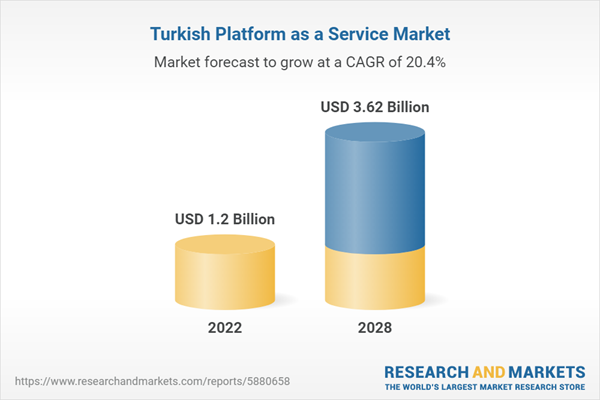Speak directly to the analyst to clarify any post sales queries you may have.
10% Free customizationThis report comes with 10% free customization, enabling you to add data that meets your specific business needs.
In the projected period of 2024-2028, the Turkey Platform as a Service Market is expected to develop at a rapid pace. The government is the driving force behind digital endeavours, and Platform-as-a-Service stands out as a critical component of many of their modernization initiatives. Because these domestically located facilities comply with Turkey's data residency and governance laws, continued investments by local and foreign technology providers in the country's new data centres have accelerated cloud adoption. These investments have also enabled hybrid multi-cloud environments-public and private clouds that coexist with traditional on-premises equipment. In recent years, the Platform-as-a-Service (Platform as a Service) market in Turkey has experienced significant growth, driven by the increasing adoption of cloud technology, digital transformation initiatives, and government support. Platform as a Service is a cloud-based service model that enables developers to build, deploy, and manage applications without the need for underlying infrastructure.
Increased Market-Driving Use of Big Data, AI, Machine Learning, IT Effectiveness, and Business Innovation
Machine learning and artificial intelligence are projected to boost the Platform-as-a-Service market. Platform as a Service offers cloud computing, big data, analytics, data management, and advanced technologies like AI and machine learning to optimize corporate operations, reducing costs and increasing productivity. The application of Platform as a Service in various industries such as healthcare, finance, transportation, and manufacturing has increased demand in the market, thanks to its ability to make IT more responsive to business opportunities, thereby enhancing both top and bottom-line performance. Platform as a Service enables the swift development of mobile apps, utilization of chatbots for more engaging user experiences, utilization of blockchain for more secure transactions, acceleration of release cycles with containers and APIs, and improved data discovery and analysis.To compete in today's fast-paced and highly competitive digital landscape, organizations must constantly innovate and pilot new cloud computing solutions while also staying attuned to the evolving needs and preferences of consumers and the market. This includes marketing in the cloud, which is rapidly shifting towards automated processes and data-driven decision-making. The shift towards automation and data-driven decision-making in cloud-based marketing is driven by the need for agility, scalability, and cost-effectiveness. With the help of cloud-based solutions, organizations can quickly and efficiently collect, process, and analyse vast amounts of data from multiple sources to gain valuable insights into consumer behaviour, preferences, and trends. This, in turn, enables them to make informed decisions and optimize marketing strategies for maximum impact. Moreover, cloud-based marketing solutions offer unparalleled scalability and flexibility, allowing organizations to quickly scale up or down their marketing operations to meet changing business needs and market conditions. Cloud-based marketing platforms also provide a level of automation that enables organizations to streamline their marketing processes, reduce manual intervention, and improve overall efficiency.
In conclusion, marketing in the cloud is rapidly evolving, with the focus shifting towards automated processes and data-driven decision-making. By leveraging cloud-based solutions, organizations can gain valuable insights, optimize their marketing strategies, and improve overall efficiency and agility, all while staying attuned to the rapidly changing needs of consumers and the market.
The Turkey Platform as a Service market is expected to witness significant growth over the forecast period, driven by several factors such as the increasing demand for low-cost and scalable solutions, the rising adoption of DevOps practices, and the increasing use of containerization and microservices. Turkey has a large and growing startup ecosystem that is fueling the demand for Platform as a Service solutions. Startups are looking for agile, scalable, and cost-effective solutions to develop and deploy their applications. Platform as a Service solutions are becoming increasingly popular among startups as they offer a flexible and scalable environment for application development and deployment.
Turkey Platform as a Service Market Challenges
In the realm of enterprise technology, cost is a critical consideration for decision-makers. Traditionally, businesses have been accustomed to procuring large quantities of quantifiable commodities such as licenses or hardware, which are then complemented with various services such as per-server administrative fees, per-CPU performance enhancements, and per-hour technical labor. While this approach has its benefits, one of the key advantages is the ease of cost calculation. However, the rise of cloud computing has introduced a new dimension to cost management. Unlike the traditional approach, cloud-based services often require businesses to pay only for what they use, resulting in a more flexible and dynamic cost structure. This can be both a blessing and a curse for decision-makers, as it can be challenging to accurately estimate costs in advance. Nonetheless, with the right strategies and tools, businesses can effectively manage cloud costs while also unlocking the potential benefits of this technology. From leveraging cost optimization features provided by cloud providers to implementing rigorous monitoring and analysis, organizations can ensure that they are not only keeping their cloud costs under control but also maximizing the value of their investment.In summary, while the traditional approach to technology procurement and cost management has its merits, the rise of cloud computing has introduced new complexities and opportunities. By adopting proactive cost management strategies, organizations can effectively balance cost and value and stay ahead of the curve in the rapidly evolving technology landscape. Cloud malware injection, meltdowns, account or service hijacking, and man-in-the-cloud attacks expose company data vulnerabilities, which can result in business closure and losses. Cyber-attacks, on the other hand, disrupt corporate operations and limit the growth of the Platform-as-a-Service market.
Market Segments
Turkey Platform as a Service Market is segmented into Type, Deployment, Organization Size and Industry Vertical. Based on Type, the market is segmented into Application Platform as a Service, Integration Platform as a Service, and Database Platform as a Service. Based on Organization Size, the market segmented into Large Enterprise, Small & Medium Enterprise, Based on Industry Vertical, the market is divided into BFSI, Consumer Goods, IT & Telecom, Manufacturing, Healthcare, Energy & Utilities, Others. The market analysis also studies the regional segmentation to devise regional market segmentation, divided among Marmara, Central Anatolia, Mediterranean, Aegean, Southeastern Anatolia, Black Sea, Eastern Anatolia region.Market Players
Major market players of Turkey Platform as a Service Market are IBM Turkey, Heraklet Information Technologies, Ronwell Digital, Innova, a Turk Telekom Company, Oracle Turkey, Commencis, NourNet, TECHIVE YAZILIM, SYNETA and Suncode IT Solutions and Consultancy Ltd. Co.Report Scope:
In this report, Turkey Platform as a Service Market has been segmented into following categories, in addition to the industry trends which have also been detailed below:Turkey Platform as a Service Market, By Type:
- Application Platform as a Service
- Integration Platform as a Service
- Database Platform as a Service
Turkey Platform as a Service Market, By Deployment:
- Private
- Public
Turkey Platform as a Service Market, By Organization Size:
- Large Enterprise
- Small & Medium Enterprise
Turkey Platform as a Service Market, By Industry Vertical:
- BFSI
- Consumer Goods
- IT & Telecom
- Manufacturing
- Healthcare
- Energy & Utilities
- Others
Turkey Platform as a Service Market, By Region:
- Marmara
- Central Anatolia
- Mediterranean
- Aegean
- Southeastern Anatolia
- Black sea
- Eastern Anatolia
Competitive Landscape
Company Profiles: Detailed analysis of the major companies present in Turkey Platform as a Service MarketAvailable Customizations:
Turkey Platform as a Service Market with the given market data, the publisher offers customizations according to a company’s specific needs.This product will be delivered within 1-3 business days.
Table of Contents
Companies Mentioned
- IBM Turkey
- Ronwell Digital
- Heraklet Information Technologies
- Oracle Turkey
- Commencis
- TECHIVE YAZILIM
- NourNet
- SYNETA
- Innova, a Turk Telekom Company
- Suncode IT Solutions and Consultancy Ltd. Co.
Table Information
| Report Attribute | Details |
|---|---|
| No. of Pages | 78 |
| Published | September 2023 |
| Forecast Period | 2022 - 2028 |
| Estimated Market Value ( USD | $ 1.2 Billion |
| Forecasted Market Value ( USD | $ 3.62 Billion |
| Compound Annual Growth Rate | 20.4% |
| Regions Covered | Turkey |
| No. of Companies Mentioned | 10 |









